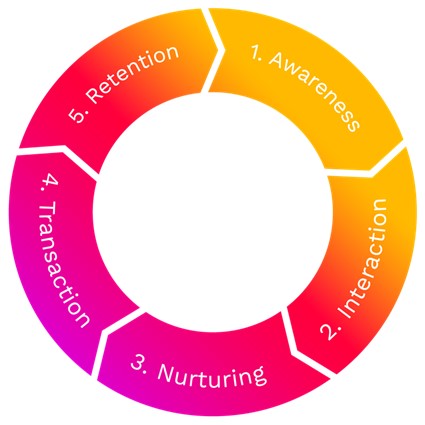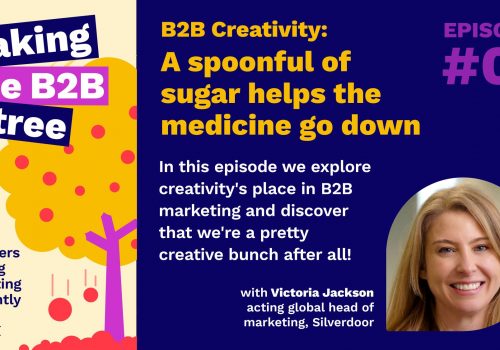As B2B PR and marketing specialists, we understand the importance of building brilliant business relationships and believe this plays a central role in any successful marketing strategy . However, we are also aware that meaningful interactions with customers and stakeholders don’t just happen overnight.
With this in mind, we were keen to explore how B2B businesses from different industries value each stage of the relationship lifecycle and recently held a roundtable with some of our Skout friends (all senior B2B marketing professionals) to discuss this further. Without giving too much away (as we will be dazzling you in 2022 with a wealth of content related to the topic), we thought we’d give you a taster of what they had to say.
The B2B relationship roundtable
Participants included a regional marketing director for a leading white goods company who has recently taken on global responsibilities; an experienced senior marketer who started their own freelance business during the pandemic; a marketing director who has been tasked with updating a marketing department that hasn’t changed in a decade; and, the head of retail brand and comms for a UK business energy supplier. It’s safe to say, our roundtable consisted of a varied and knowledgeable bunch!
Q: Why are relationships crucial in B2B marketing?
In short, all participants agreed that relationships are very different depending on the type of customer and what they’re buying. For example, customers that spend millions will be treated on a more personal level than those at the smaller end. For example, “SMEs don’t want to be ‘suited and booted’ by a finance person as they are usually just interested in reliability and good prices”.
There was also a consensus that relationships are two-way and sometimes businesses fall into the trap of giving information rather than listening to what customers want. This is where the transition from marketing and relationship management comes in. “You want the customer to experience the message at every part of the journey. This can only be done by looking at the full relationship cycle. For example, you need to think about what the customer might consider to be a relationship and if needed change the goal posts of where it begins and ends.”
Managing relationships can be tricky, especially if the data is poor and there is no CRM in place. “Having the right systems and data is critical before a relationship can really be nurtured,” we were told. Yet, complexities also arise from the different forms of customer interaction required and “it’s essential to consider where communications need to come from and what form it needs to be. CRM is the only way to effectively manage this at scale.”
Defining what a relationship is varied between the marketers we spoke to. For some, “only customers that have already interacted with the service or product is considered to be in the relationship cycle.” For others, “the customer journey should be considered as a relationship, no matter how short.” We found it interesting that all participants immediately focused on the customer relationship rather than those with other stakeholders such as suppliers, employees, partners, and shareholders.
Q: The beginning, middle and end – what should the B2B relationship life cycle look like?
Overall, the beginning of a relationship gets the most investment, especially when attracting bigger customers. “First impressions count as they are constantly evaluating you – think about what you are putting on your social media channels as this is often a way of putting your profile out there and getting their attention.”
However, this is challenging marketing efforts on the middle and end of the relationship cycle. One of our participants told us: “There is a focus on the beginning of a relationship and existing customers can get forgotten about. It’s important to have a strategy in place to ensure this doesn’t happen.”
For businesses that use a subscription model, it’s the contract that determines how much effort is put in. “The shorter the contract, the more proactive the approach and you need to ensure there is enough outreach at the end for customers to re-subscribe. The relationship cycle does a really good job at defining this as each touch point serves as a guide.”

Q. Who in your business is proactively involved in creating and maintaining relationships?
For all participants, it’s a mix of sales and marketing and there is a need for both functions to work in tandem to achieve successful outcomes.
One participant emphasised that categorising audiences is not always the way forward as the younger generation, who are more tech savvy, will see through it. While sales and marketing are primarily involved in proactively creating and maintaining relationships, it’s important to break down organisational siloes for personalisation to be truly effective – meaning other members of the business may need to get involved. For example, “if a customer is asking a certain question there needs to be time spent finding the right person to respond.”
Q. In the current landscape are B2B organisations/marketers getting better or worse at relationships?
Covid-19 highlighted the need to communicate effectively internally and there was a massive increase in requirements centred around internal comms and relationships as this indirectly feeds into external messaging. Without the right tech in place, it can be challenging to reach out to remote employees, especially as there is less direct access to them. To provide the relevant information to the right people within the business, it is essential to extend what’s happening in the office to online.
“Technology has broken down myths such as the need to be in the office environment physically. While it’s important to meet from a social perspective, you can do what you need to do virtually quite easily. You need to consider what contact do you need for good relationships.”
However, it’s not all centred around digital communication tools. One respondent stated that the current landscape has encouraged them to think differently about how the business can help each customer. “As a large business, we implemented a recovery programme for our partners to support sales. This included discounts on products as well as support with lead management – all of which was geared around the relationship.”
A business needs to work together as one organism and deliver an experience to customers; part of this is relies on delivering the basics well. This should include listening to customers and pivoting accordingly. “This means knowing our place, not overstepping, and delivering a good service.”
Q: What are the best marketing activities to build relationships?
Here’s the advice our roundtable participants had to offer:
“There’s element that you can’t replicate when building strong connections. For example, people leaving and taking the customer base with them – it’s important that everyone gets the whole experience.”
“You need the business ethos to embed itself in the customer dynamic and make sure it’s something they don’t want to give up.”
“Quarterly meetings with account management and providing expertise to customers.”
“Putting forums together with customers/stakeholders that have similar needs. While there is a risk that pricing could be discussed, the value can be justified as this provides an opportunity for customers to network and form relationships.”
“Transparency – sharing more of your strategy with customer.”
“Good data and personalisation.”
“Optimising local marketing initiatives, investing time in the right places and using stories to help other businesses.”
“Knowing where you need to improve and how marketing can help you do that.”
What we think!
Marketing has evolved. The acceleration of technology combined with the impact of the pandemic has changed the way we connect with customers, employees, and stakeholders, with many businesses relying on digital tools to facilitate communications. While this has enabled marketers to engage with audiences through a wide range of channels, personalise those comms and speed up interaction using automated platforms, there is also an argument to suggest this overreliance on ‘push button’ tech can create a disconnect.
In our view, this is where marketers need to revaluate and invest in their relationships by asking questions such as: Where in the relationship cycle is this customer? What do they want to know? What will they find valuable? How does our content help them solve the challenges they encounter? And, what channels/platforms can we use to effectively reach them? This will help create a more personalised approach to marketing and build a relationship of trust.
We will be revealing more insights about what B2B marketers think about the relationship lifecycle soon! Keep your eyes peeled on our website and social media feeds in 2022 for some useful resources. Want to be part of the conversation? Feel free to get in touch on info@skoutpr.com.













